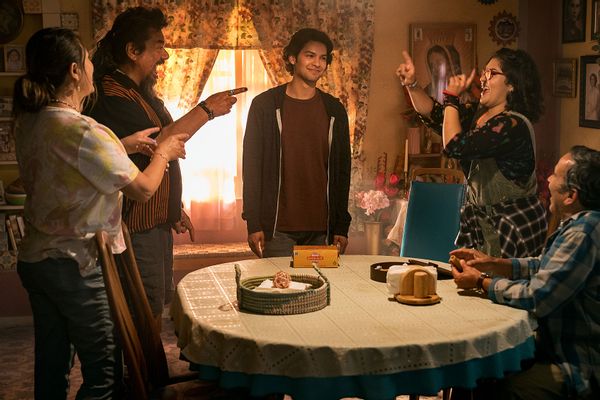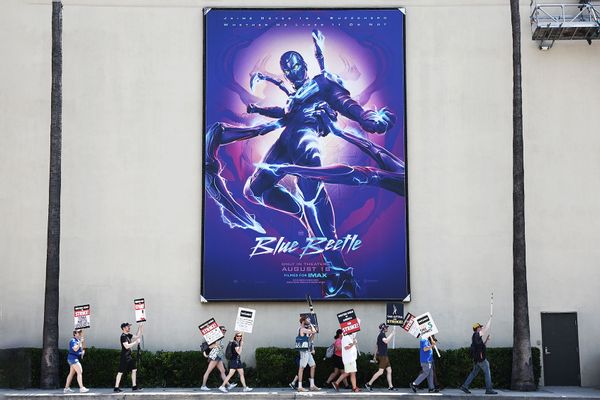
Warner Bros. Pictures and DC Comics' "Blue Beetle," the first live-action Latino superhero film, leapt over some high barriers to top the box office in its debut weekend, displacing Warner Bros. behemoth summer hit, "Barbie."
Because the cast of "Blue Beetle" was sidelined from promoting the film due to the actors' strike, Latino organizations wrote an open letter calling on audiences to watch the movie in theaters, and fans started their own social media campaigns under the banner #bluebeetlebattalion to drive turnout. They managed to pull out a victory.
But at the same time the first "Blue Beetle" audiences were buying their tickets for Thursday night screenings, the USC Annenberg Inclusion Initiative published the latest edition in its ongoing study on diversity in Hollywood. Representation both on and behind the screen is virtually unchanged since the study began in 2007. Women, people of color, LGBTQ+ and disabled persons continue to be cast aside.
Women and girls held fewer than 35% of speaking roles in films released in 2022, according to the study. Among racial and ethnic groups, Latinos continued to be the most underrepresented group per capita in film. The researchers found that Latinos accounted for about 5% of speaking roles in films. Latinos comprise about a fifth of the U.S. population, according to the U.S. Census.
With a cast that's predominantly Latino, a Puerto Rican director in Ángel Manuel Soto, and a Mexican screenwriter in Gareth Dunnet-Alcocer, "Blue Beetle" could move Hollywood Latino representation up a few percentage points this year, but not enough to make up for decades of lost stories: Latino talent who missed out on casting opportunities, scripts centering on Latino experiences that were never produced, and underrepresented directors who never got a shot at a superhero-sized budget.
Still, it's a start. "Blue Beetle" can be a blueprint for the kind of deeper change Hollywood needs. The film features more than a token diverse character and, critically, employs POC on both sides of the camera. In "Blue Beetle," Jaime Reyes (Xolo Maridueña) is a young man with big ambitions and a big Mexican American family. When the reality of his family's finances comes to light, he puts his dreams on hold to help them. By chance, Jaime crosses paths with a mystical blue scarab that attaches itself to him, and he becomes the superhero Blue Beetle. When crisis comes to the Reyes home, his family also steps up to help him, whether that's pulling off a mischievous heist with his Uncle Rudy (George Lopez) or fighting alongside his Nana (Adriana Barraza), an anti-imperialist fighter in the Mexican Revolution. The movie goes beyond the usual CGI fight fests to weave in mentions of gentrification, undocumented family members and the harrowing legacy of the United States' interventions in Latin America through the School of the Americas.

Cultural references roll off characters' tongues like they were pronouncing their "rr's." They're seamless and natural, from old school Mexican music to alluding to classic telenovelas, the long-running variety show "Sábado Gigante" and the Mexican horror movie "Macario." The family switches easily between Spanish and English. It's not just a few words of affection, either. There's plenty of non-English dialogue blended naturally into the fabric of the Reyeses' conversations. It's more than just representation for representation's sake. It reflects the care of the filmmakers and cast to hit the right tone, the body language, the word choices to feel authentic. In doing so, they reflect the actual lives of the millions of Latinos who watch U.S. films but seldom appear in them.
Considering that the industry more often erases Latino presence than celebrates it, the fact that "Blue Beetle" is so unapologetically proud of its roots and celebrates us as heroes feels like progress — yes, even for a family-friendly superhero movie. At a time when a number of Latino-led TV shows are among the first to get the ax or taken off of streaming services, "Blue Beetle" is pushing back against corporate mandates and DEI initiatives that have failed to lead to more Latino creative talent in the entertainment industry.
"Blue Beetle's" big-screen appearance almost never happened. The film was supposed to premiere on the streaming service now known as Max, the same release strategy that was slated for "Batgirl," starring the Latina Leslie Grace Martínez. Warner Bros. Discovery (the parent company of the DC Extended Universe) controversially canceled "Batgirl" before its completion.
Although "Blue Beetle" is finally enjoying its long-delayed debut, Hollywood's systemic issues require much more than one movie to be fixed. It will take a multiverse of different industrywide efforts and internal change at various decision-making levels to fix the industry's broken talent pipeline, and the WGA and SAG-AFTRA strikes are a part of those efforts. The strike issues include shrinking residuals and mini-writers' rooms, a new kind of economic precarity that may force more working class, underrepresented writers and actors to leave the business.

A new deal would also support writers like Dunnet-Alcocer, who told The Hollywood Reporter about the challenges many Latino writers face. "Latino writers don't usually come from wealth," he said. "So that's an extra pressure. The less economic infrastructure you have to help you survive this, it's less chance to write and express their stories because you can't write."
The flux state of streaming platforms has proven to be a double-edged sword, with services greenlighting many diverse series but allowing few enough time to find an audience. Soto's previous film, "Charm City Kings," was among those acquired exclusively for HBO Max but later dropped from the service in the 2022 corporate shuffle. It's now available to rent on VOD, which means curious viewers have to search a little harder and pay extra to see it.
Like most recent superhero movies, "Blue Beetle" is set to return for a sequel. Hopefully, he'll enjoy the success of the animated Puerto Rican Spider-Man Miles Morales, and return in multiple big-screen adventures. But to truly make movie casts look more like the U.S. population, increased support for "Blue Beetle" will have to extend to Latino talent in scrappy indies, nonfranchise movies and comic book-inspired blockbusters alike.
The necessary quadrupling of Latinos in film will take more than a single heroic effort. Addressing the persistent lack of girls and women on screen, the USC study's author, Stacy L. Smith, identified the same villain menacing everyone except straight, white, able-bodied men. "It is clear the entertainment industry has little desire or motivation to improve casting processes in a way that creates meaningful change," she said.







